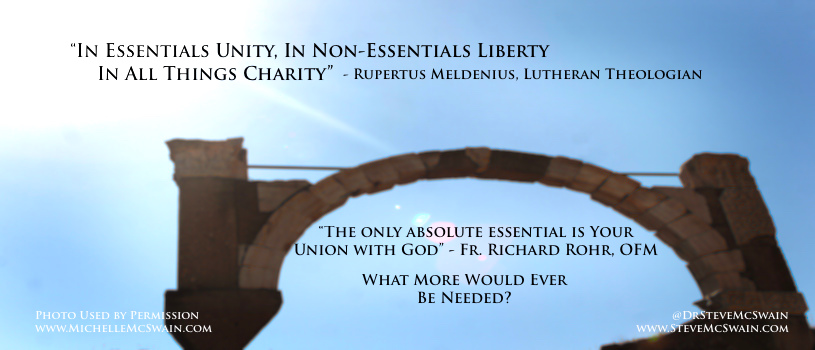
“In essentials unity…in non-essentials liberty…in all things charity.”
I have heard this phrase for the greater part of my religious life. In fact, I am pretty sure I have used the phrase myself. It is a much more helpful position to adopt in this world of multi-religious beliefs.
I have heard it used among Christians and, since there are more Baptists than there are flavors of Baskin-Robbins ice cream, for example – not to speak of all the other denominations within Christianity – I suppose adopting this as your modus operandi can be helpful. But, if there is anything the internet has done for us, it has made many of us delightfully aware of just how varied the religious and/or spiritual landscape is here in the U.S. alone.
America is close to passing India, and actually may have passed it already, as the most religiously-diverse country in the world.
How will we survive this? Will we survive it?
I think the jury is still out on this one.
But my own conviction is this: as long as we insist there are “essentials” in any religion that are regarded as “non-negotiable” then I suspect the disagreements, followed by the debates, and, ultimately, then the divisions (that seems to be the inevitable progression of things, doesn’t it?) even between people within the same religious tradition will answer the question of human survival…the question of the future of humanity.
It is a big question for which there are no little answers. Which explains why “Rapture-minded” Christians have booked their flights early to escape the madness they’re secretly scared but certain is about to unfold.
I think that rather “big” of them, if you ask me. Frankly, I’m a little more inclined to think Jesus’ method of “facing the music” is a little more in keeping with his way of dealing with opposition and difficulty. Love embraces. It doesn’t look for an escape hatch to imaginary freedom.
But don’t take my word for it. Try reading what we Christians call the Gospel. It’s a little radical I know but it is the “WAY” of Jesus. Which is of course what Jesus meant by “way, truth, and life.” It’s not the way most choose, but one “narrow and difficult” (Matt. 7:14).
When it comes to “essentials” in any faith tradition, however, tell me something: Who decides what the essentials are?
My beloved Catholic friends say, “The Church, Scripture, and Tradition.” But you can’t even get two Catholic Popes to agree on what within any of these is really “essential.” Pope Benedict and Pope Francis represent two vastly different views of what’s “essential.” Don’t let anybody tell you differently. They do.
My friends among Protestants and Evangelicals say, “Sola Scriptura” – I love that one.
Frankly, I’m at that place in my spiritual pilgrimage where I have decided there are no “essentials.”
Except maybe one.
And, interestingly, a Catholic Franciscan framed it pretty well. I suspect Father Richard Rohr, OFM may be on to something, when he says, “The only absolute essential is your union with God.”
Isn’t that all that really matters?
And, isn’t it true, if we add anything else, we are only admitting we have not found our own union with God to be “essential” enough?
Dr. Steve McSwain is an author and speaker, counselor to non-profits and congregations, an advocate in the fields of self-development, interfaith cooperation, and spiritual growth. His blogs at BeliefNet.com, the Huffington Post, as well as his own website (www.SteveMcSwain.com) inspire people of all faith traditions. Dr. McSwain is an Ambassador to the Council on the Parliament for the World’s Religions. His interfaith pendants are worn by thousands on virtually every continent, sharing his vision of creating a more conscious, compassionate, and charitable world. Visit his website for more information or to book him for an inspirational talk on happiness, inner peace, interfaith respect or charitable living.

